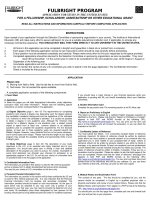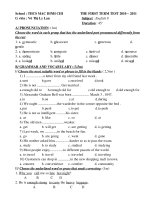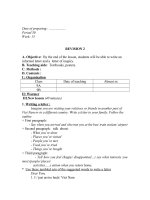Bài giảng tiếng anh môn speaking 3
Bạn đang xem bản rút gọn của tài liệu. Xem và tải ngay bản đầy đủ của tài liệu tại đây (2.08 MB, 62 trang )
SPEAKING 3
Lê Hoàng Duy Thuần
Trần Thị Minh Khánh
Nha Trang, October 2014
Lê Hoàng Duy Thuần
Trần Thị Minh Khánh
Nha Trang, October 2014
Course description
Course materials:
1. Jack. C. Richards- Passages 1 & 2 – 2008 - Cambridge University
Press.
2. Leo Jones- Let’s Talk 3- 2004- Cambridge University Press.
Time allotted for each topic:
• Introduction to the subject: 2 periods
• Education & learning: 6 periods
• Entertainment: 6 periods
• Health: 6 periods
• Culture: 6 periods
• Mid-term and Final Tests: 4 periods
Assessment:
• Participation: 10%
• Mid-term and final tests: 40%
• Examination: 50%
Course materials:
1. Jack. C. Richards- Passages 1 & 2 – 2008 - Cambridge University
Press.
2. Leo Jones- Let’s Talk 3- 2004- Cambridge University Press.
Time allotted for each topic:
• Introduction to the subject: 2 periods
• Education & learning: 6 periods
• Entertainment: 6 periods
• Health: 6 periods
• Culture: 6 periods
• Mid-term and Final Tests: 4 periods
Assessment:
• Participation: 10%
• Mid-term and final tests: 40%
• Examination: 50%
TOPIC 1: EDUCATION & LEARNING
TOPIC 1: EDUCATION & LEARNING
School days
• What’s happening in each class?
• How are these classes different from your classes?
• Which class do you prefer to be in? why?
• Match the words with their meanings:
Useful Structures
• Would you rather take …… or…… ?
• I’d rather take ……….
• I’d rather not take ………
• I’d rather take ……. than study ……
• Would you rather take …… or…… ?
• I’d rather take ……….
• I’d rather not take ………
• I’d rather take ……. than study ……
Interview each other about high school days and school
days from another period of your life. Take notes.
• What are the qualities of a good student? a good
teacher?
• Do you think teachers should be strict? Why or why
not?
• Would you like to be a teacher? Why or why not?
• What are the qualities of a good student? a good
teacher?
• Do you think teachers should be strict? Why or why
not?
• Would you like to be a teacher? Why or why not?
Ask each other these questions. How much can you
remember?
Work with people you don’t know very well. Find out
this information from this person. Don’t take notes but
try to remember everything.
Discuss these questions
Learning styles
Study techniques:
What study techniques do you use and say why?
Take this quiz. Ask your partner the questions, and circle the answers.
Learning styles:
Which learning styles do you think are best for you?
Think of a recent classroom lesson that worked well for
you. Why did it work well? Which learning styles did it
use?
Think of something else that they tried to learn but with less
success. Tell your stories to your partner.
Which learning styles do you think are best for you?
Think of a recent classroom lesson that worked well for
you. Why did it work well? Which learning styles did it
use?
Think of something else that they tried to learn but with less
success. Tell your stories to your partner.
Education
Activity 1:Activity 1:
PrePre activity:activity:
Discuss in pairs:
• What are or were your favorite subjects?
• What is education for? Give the definition of education.
• What would you change about the education that you have
had if you could?
Activity 1:Activity 1:
PrePre activity:activity:
Discuss in pairs:
• What are or were your favorite subjects?
• What is education for? Give the definition of education.
• What would you change about the education that you have
had if you could?
Main activityMain activity::
Suppose that you are going to be school head teachers.
Work in pairs and choose 2 schools to manage.
Plan a weekly timetable for the school you choose,
including:
- Suitable subjects for each period
- Free study periods
- School trip to a suitable place
- Lesson times and lengths.
- …
Use your imagination to produce interesting and
unusual timetables. Represent the educational
attitudes/educational aims of the school
Main activityMain activity::
Suppose that you are going to be school head teachers.
Work in pairs and choose 2 schools to manage.
Plan a weekly timetable for the school you choose,
including:
- Suitable subjects for each period
- Free study periods
- School trip to a suitable place
- Lesson times and lengths.
- …
Use your imagination to produce interesting and
unusual timetables. Represent the educational
attitudes/educational aims of the school
Activity 2Activity 2::
Mingle the groups so that each group has one person reads each
text.
Each student tells each other about the text (work from the notes,
not read the text out loud) and share the points that you
discuss in the previous group.
In your new group, discuss these questions together:
1. What are the main similarities and differences between the
schools?
2. What is the most surprising feature and why?
3. How do the schools compare with your own experiences?
4. Which school do you think is likely to be the most successful
and why?
5. Which school offers the best preparation for life?
6. Which school would you like to have attended and why?
Activity 2Activity 2::
Mingle the groups so that each group has one person reads each
text.
Each student tells each other about the text (work from the notes,
not read the text out loud) and share the points that you
discuss in the previous group.
In your new group, discuss these questions together:
1. What are the main similarities and differences between the
schools?
2. What is the most surprising feature and why?
3. How do the schools compare with your own experiences?
4. Which school do you think is likely to be the most successful
and why?
5. Which school offers the best preparation for life?
6. Which school would you like to have attended and why?
4. University education:
Tasks in class: Group presentation
Each group presents main information from the website that
should be read before class about learning skills at
university, including the issues:
• Making the Most of Lectures
• Working in Groups
• Learning Independently
• Critical Thinking
• Reading and Remembering
• Giving an Oral Presentation
• Researching Assignments
• Coping with Exams
Tasks in class: Group presentation
Each group presents main information from the website that
should be read before class about learning skills at
university, including the issues:
• Making the Most of Lectures
• Working in Groups
• Learning Independently
• Critical Thinking
• Reading and Remembering
• Giving an Oral Presentation
• Researching Assignments
• Coping with Exams
TOPIC 2: ENTERTAINMENT
TOPIC 2: ENTERTAINMENT
Read these blog posts about TV programs. Which program would you
like most to watch? Which one would least interest you? Why?
What are your favorite TV programs? What do you like about them?
Look at the different types of TV programs. Check (V)
the ones that you know. Then ask a partner about the
ones you don’t know.
Which types of TV shows do you watch? Can you name
an example of each type of program above?
Read these comments on the positive and negative influences of
television.can you think of additional influences?
Discuss the comments. Give reasons why you think they are
positive or negative.
Read the opinions about reading today. Do you agree with the
comments?
What role does reading play in your life? Talk about it with a partner.
Do these adjectives have a positive or a negative meaning? Mark
them + or -
Complete these sentences with one or more of the adjectives above.
Complete these sentences with one or more of the adjectives above.
Discuss the results of this survey on pleasure-reading
preferences. Are women’s and men’s preferences the same
where you live?
Brainstorm as many examples of the books as you can for the
different types of reading genres. Then find out who in your
group has read the books, and share your reactions.
Read the statements expressing different views on
music. Which one do you agree with?
What kinds of things do you look for in new songs or artists? What makes
certain songs more successful than others?









